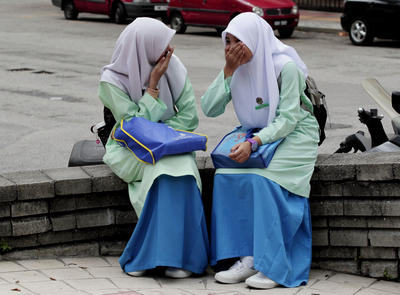The election’s outcome and the immediate responses of the BN leadership threaten to undermine the powerful example of Malaysia as an Islamic country with a parliamentary democracy and parallel legal systems of civil and Islamic laws.
Dealing with the racial and social issues that surfaced in this election will be the biggest challenge in BN’s new term. Racial problems matter externally, too, especially to Southeast Asia and the United States, because they could threaten the economic stability of Malaysia. On the other hand, if Malaysia properly deals with racial issues and electoral fraud and allows fair competition for opposition parties it could be a sign that autocratic leaders are changing their ways in Southeast Asia, allowing mature competition and more accountability in governance.
So what happened in Malaysia’s election? BN won 133 parliamentary seats to PR’s 89, but lost the popular vote. This is the result of the gross imbalance in the sizes of electoral districts, which range from less than 25,000 to over 100,000 voters. The imbalance tends to benefit pro-BN rural districts at the expense of urban voters.
Rather than be chastened by the fact that more Malaysian voters preferred the opposition, Prime Minister Najib Razak held the Chinese population in Malaysia responsible, calling the result a ‘Chinese tsunami’. Najib’s attempt to racialise the election outcome was a grave strategic error and indicates that BN does not want to bridge the racial divide any time soon. This racial marginalisation only fuelled more anger among many Malaysians who feel they were robbed of a clean and fair election. The opposition, meanwhile, can call the election a success. Even though PR failed to generate regime change, it successfully created a pan-racial opposition and changed Malaysian politics forever by highlighting government corruption and the abuse of affirmative-action pro-Malay policies.
Affirmative action was implemented in the 1970s to create opportunities for Malays and to defuse inter-ethnic tensions following the 1969 racial riots, but it has been used primarily to exclude sizeable Chinese and Indian Malaysian minorities from positions in government and the economy. Now it is not only the ethnic Chinese and Indians who want reform: a large number of urban Malays, who feel affirmative action benefits only a small group of rich and well-connected Malay elites, have changed their position on racial politics. But Najib is not responding to their concerns.
In his victory speech, Najib announced a national reconciliation plan to superficially address the racial issue, but voter disenchantment with BN is also a product of Malaysia’s urban–rural divide. If left unattended, the social division between rural and urban populations could weaken the stability of Southeast Asia’s third-largest economy and mean Malaysia is caught in the middle-income trap. Malaysia used to be a ‘tiger economy’ but it has stagnated recently compared to other Asian countries. The New Economic Model implemented by Najib in 2010 increased private investment and improved Malaysia’s business climate, but it did not address the affirmative action policies that give ethnic Malays privileged access to a range of economic opportunities through government-linked corporations.
If Najib is serious about bringing 1Malaysia to reality, he must first eliminate racial politics and affirmative action. There is a desperate need for ethnicity-blind programs targeted toward poorer areas, which, besides alleviating poverty, will also help eliminate discrimination against poor ethnic Chinese and Indians. There will always be strong opposition to an inclusive Malaysia, but equality is the only way for Malaysia to prosper in the long term. With all the proper institutions already in place, BN has a great opportunity to bring real change, and it has to act for its own survival. The next election in 2018 will see an even younger, further urbanised and more demanding population. If it is to stay relevant, BN must tackle the disenchantment of ordinary Malaysians, whatever their race.
HuiHui Ooi is assistant director of the Brent Scowcroft Center on International Security.
This article was first published here on the Atlantic Council.

